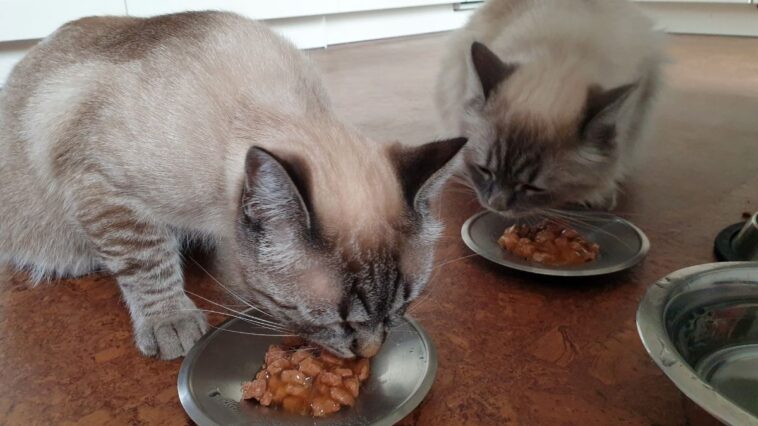Cats are curious creatures that love to explore and try out new things. As a cat owner, you may have caught your furry friend sneaking a taste of your food, and you’re left wondering whether it’s safe. One popular food item many cat owners need clarification on is baked beans.
While some sources say that baked beans are safe for cats to consume, others warn against it. So, can cats eat baked beans? In this article, we’ll delve into the nutritional value of baked beans and their potential health benefits and risks for cats.
We’ll also provide tips on what to do if your cat accidentally eats baked beans and share some healthy cat-friendly alternatives to this popular human food. Read on to learn everything you need about cats and baked beans.
Can Cats Eat Baked Beans?
Feeding baked beans to cats is not recommended. While baked beans may be a good source of protein, fiber, and carbohydrates for humans, they are not ideal for cats. Cats have different dietary requirements than humans, as they are obligate carnivores. Cats require animal protein for optimal health, and their bodies are not designed to digest plant-based proteins effectively.
Baked beans often contain seasonings, spices, and other ingredients that may not be suitable for feline consumption. For example, baked beans are commonly seasoned with onion and garlic, which are toxic to cats. These ingredients can cause damage to a cat’s red blood cells and lead to anemia. Additionally, baked beans may have high levels of salt and sugar, which can cause dehydration, gastrointestinal upset, and other health issues in cats.
If your cat accidentally consumes baked beans, monitoring them closely for any signs of illness is important. Symptoms of baked bean poisoning in cats can include vomiting, diarrhea, lethargy, dehydration, and loss of appetite. If you suspect your cat has ingested baked beans or any other toxic food, it’s best to consult a veterinarian for guidance.
High-quality commercial cat foods formulated specifically for cats are available and provide the necessary nutrients for their well-being. Instead of offering your cat baked beans, providing them with a balanced and appropriate diet that meets their nutritional needs is recommended. Choose cat-friendly alternatives like cooked chicken, turkey, or fish if you want to offer cat treats. Always ensure that any human food given to your cat is safe and suitable for their consumption.
Nutritional Value of Baked Beans
Baked beans are known for their nutritional value, primarily when consumed by humans. They offer several beneficial nutrients, including protein, fiber, iron, and other essential minerals. However, it’s important to note that these nutritional benefits are geared toward humans and not necessarily suitable for cats.
Protein is essential for muscle maintenance, repair, and other bodily functions. Baked beans are a decent source of protein, providing about 14 grams of protein per cup. Fiber is another component found in baked beans, with approximately 10 grams per cup. Fiber aids in digestion and helps maintain a healthy digestive system.
Baked beans also contain iron, an essential mineral crucial in transporting oxygen throughout the body. Iron is particularly important for red blood cell production and overall energy levels. Consuming a cup of baked beans can contribute to around 25% of humans’ recommended daily iron intake.
While baked beans offer these nutritional benefits for humans, it’s important to remember that cats have different dietary requirements. Cats are obligate carnivores, meaning they rely heavily on animal protein as the main source of nutrients. Their bodies are not designed to process plant-based proteins as efficiently. Therefore, the nutritional value of baked beans may not be suitable or appropriate for cats.
When considering your cat’s diet, it’s best to consult a veterinarian who can provide guidance based on your cat’s specific needs. They can recommend appropriate cat foods that meet nutritional requirements to ensure their health and well-being.
Potential Dangers of Baked Beans for Cats
As mentioned earlier, baked beans contain several ingredients that may not be suitable for feline consumption. For instance, baked beans are typically seasoned with onion and garlic, which are toxic to cats. Onion and garlic contain compounds that can cause oxidative damage to a cat’s red blood cells, leading to anemia. Additionally, baked beans may contain high levels of salt and sugar, which can cause dehydration, stomach upset, and other health issues in cats. Finally, baked beans may contain preservatives and additives that can harm cats.
Signs of Baked Bean Poisoning in Cats
If your cat accidentally eats baked beans, you may notice some signs of poisoning within a few hours. The symptoms of baked bean poisoning in cats may include vomiting, diarrhea, lethargy, dehydration, and loss of appetite. In severe cases, baked bean poisoning can also cause anemia, which can be life-threatening if not treated promptly. If you suspect your cat has eaten baked beans or any other toxic food, it’s essential to seek veterinary care immediately.
What to Do if Your Cat Eats Baked Beans
If your cat has consumed baked beans, taking prompt action is important to ensure their safety and well-being. Here are the steps you should follow:
- Assess the situation: Determine how much-baked beans your cat has eaten and whether it contains additional seasonings or ingredients that could harm cats, such as onion or garlic.
- Contact your veterinarian: Call your veterinarian and explain the situation. They will provide guidance based on the quantity of baked beans consumed and any potentially toxic ingredients. It’s crucial to consult with a professional to determine the best course of action for your cat.
- Follow your veterinarian’s advice: Depending on the situation, your veterinarian may recommend various actions. They may advise inducing vomiting to remove the baked beans from your cat’s stomach, especially if the ingestion occurred within the past hour. They may also recommend administering activated charcoal to absorb any toxins present. However, never induce vomiting without consulting a veterinarian first. Follow their instructions carefully.
- Observe your cat: Keep a close eye on your cat for any signs of discomfort or illness. Watch for symptoms like vomiting, diarrhea, lethargy, dehydration, loss of appetite, or any other abnormal behavior. Note any changes in their behavior or health to provide accurate information to your veterinarian if needed.
- Seek veterinary care: If your cat shows any concerning symptoms or is advised to do so by your veterinarian, take your cat to a veterinary clinic or an emergency animal hospital. The veterinarian can assess your cat’s condition, provide necessary treatments, and monitor their health closely.
Remember, it’s always better to err on caution regarding your cat’s health. Even if you’re unsure about the severity of the situation, contacting your veterinarian is the safest approach. They can offer specific advice based on your cat’s unique circumstances and ensure they receive the appropriate care.
Alternatives to Baked Beans for Cats
If you’re looking for cat-friendly alternatives to baked beans, several options can provide nutritional benefits and be safe for your feline friend. Here are some alternatives to consider:
- Cooked Meat: Cats are obligate carnivores and require animal protein for optimal health. Offer cooked chicken, turkey, or fish as a protein source. Ensure the meat is boneless, skinless, and cooked thoroughly to remove potential hazards.
- Plain Vegetables: Some cats enjoy small amounts of cooked vegetables as a treat. Green beans, peas, and carrots can be offered in moderation. However, remember that vegetables should never replace your cat’s diet’s primary animal protein source.
- Commercial Cat Foods: High-quality commercial cat foods are specifically formulated to meet the nutritional needs of cats. Look for reputable brands that offer a balanced diet and consult your veterinarian to choose the most suitable option for your cat’s age, health, and specific dietary requirements.
- Cat Treats: There are various cat treats available on the market that are specifically designed for cats and offer nutritional benefits. Look for treats formulated to support your cat’s health and made with quality ingredients.
- Homemade Cat Food: If you prefer preparing your cat’s meals at home, consult with a veterinarian or a veterinary nutritionist to ensure you provide a balanced and appropriate diet. They can guide you on proper recipes and ingredient ratios to meet your cat’s nutritional needs.
Remember to gradually introduce new foods in small portions to monitor your cat’s response. Cats can be sensitive to dietary changes, so observing any adverse reactions or digestive issues is important. Always prioritize the health and well-being of your cat by offering a balanced and appropriate diet that meets its specific nutritional requirements.
Frequently Asked Questions About Cats and Baked Beans
Q: Can cats eat baked beans with no seasoning?
A: While plain baked beans may be less harmful than seasoned ones, feeding them to cats is still not recommended.
Q: Are canned baked beans safe for cats?
A: Canned baked beans may contain preservatives and additives that can harm cats. It’s best to avoid feeding them to your furry friend altogether.
Q: Can baked beans cause kidney problems in cats?
A: Baked beans are high in sodium, which can cause dehydration and kidney problems in cats if consumed in large quantities.
Conclusion
In conclusion, baked beans are not a suitable food for cats. While they may be nutritious and delicious food for humans, they contain several ingredients that can be toxic to cats. If your cat accidentally eats baked beans, it’s essential to seek veterinary care immediately to prevent any serious health complications. As a responsible cat owner, it’s crucial to provide your furry friend with a balanced and healthy diet that meets their nutritional needs. By offering your cat healthy and cat-friendly alternatives to baked beans, you can help ensure they live a long and happy life.




